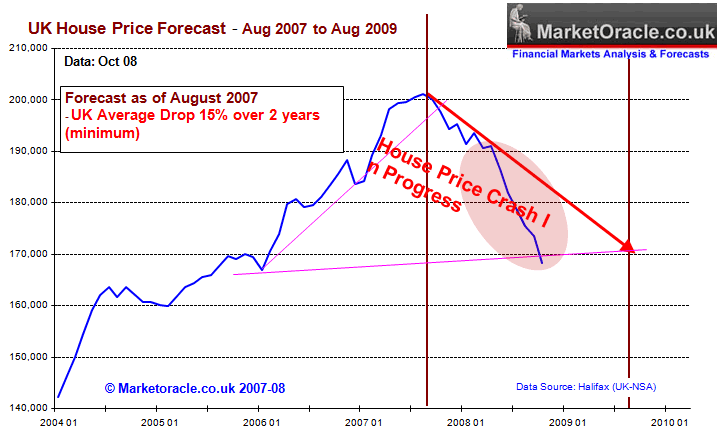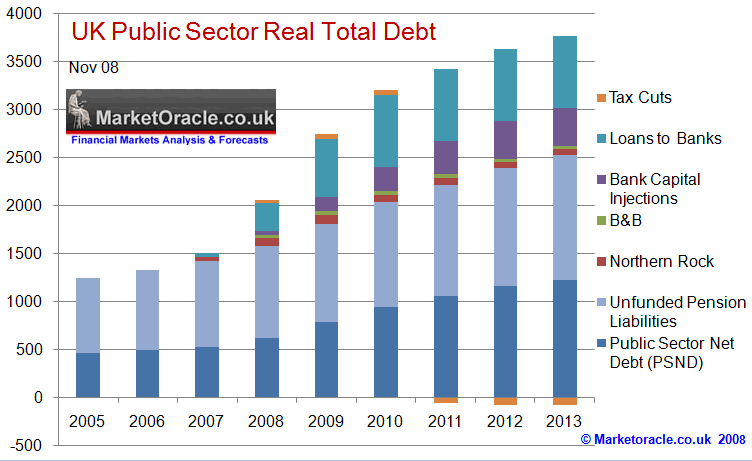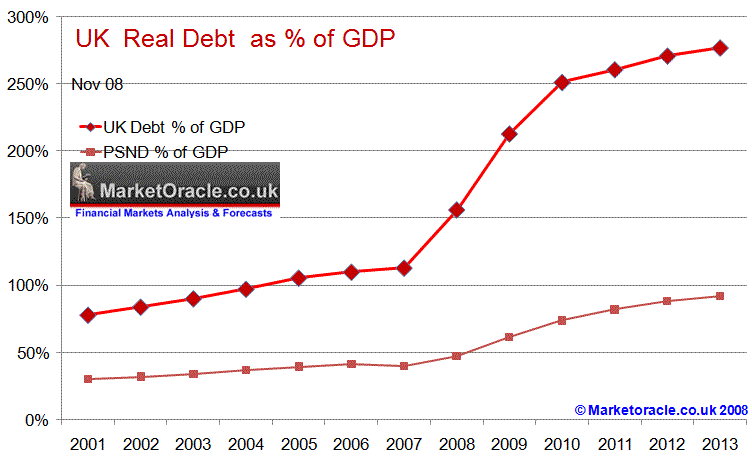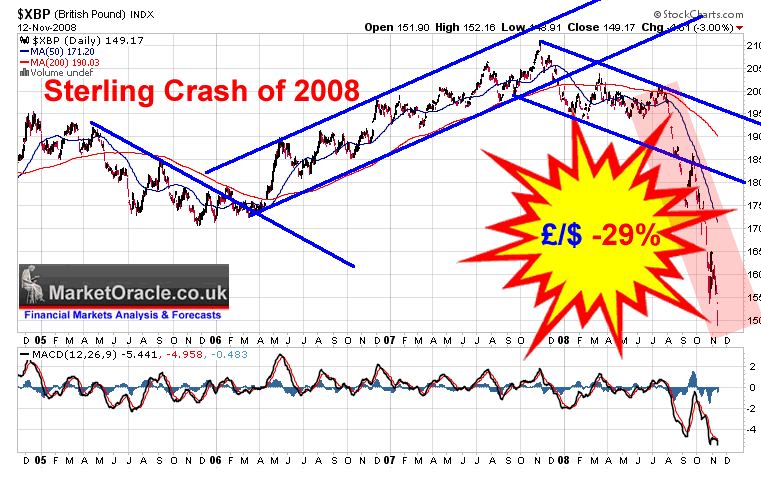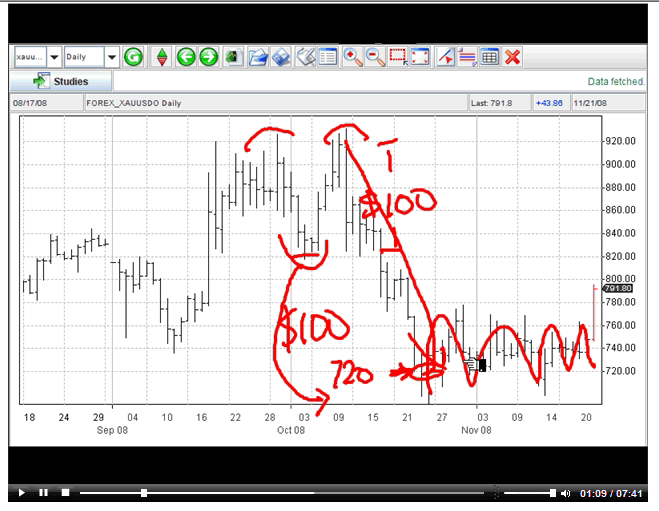Britain Trending Towards Bankruptcy and Hyper-inflation?
News_Letter / UK Economy Dec 11, 2008 - 06:33 PM GMTBy: NewsLetter
 November 28th , 2008 Issue #40 Vol. 2
November 28th , 2008 Issue #40 Vol. 2
The mainstream media is increasingly full of stories of either Britain going bankrupt or the coming deflation associated with the recession. Whilst both are now obvious given the economic data and government actions however what is missing from the headlines is that under the weight of the exploding public sector debt mountain, deflation will fast turn towards hyper-inflation as the government literally prints money in ever more panic measures aimed at turning the economy around. Many of the readers of my articles over the last year at Market Oracle will have seen this trend unfold as sustainable amounts of borrowing exploded into unsustainable liabilities due to the collapse of the bankrupt banks. Therefore this article seeks to analyse how Britain has come to towards an increased risk of bankruptcy and what action can be taken to avoid a currency collapse that is the consequences of state bankruptcy.
Britain Trending Towards Bankruptcy and Hyper-inflation?The mainstream media is increasingly full of stories of either Britain going bankrupt or the coming deflation associated with the recession. Whilst both are now obvious given the economic data and government actions however what is missing from the headlines is that under the weight of the exploding public sector debt mountain, deflation will fast turn towards hyper-inflation as the government literally prints money in ever more panic measures aimed at turning the economy around. Many of the readers of my articles over the last year at Market Oracle will have seen this trend unfold as sustainable amounts of borrowing exploded into unsustainable liabilities due to the collapse of the bankrupt banks. Therefore this article seeks to analyse how Britain has come to towards an increased risk of bankruptcy and what action can be taken to avoid a currency collapse that is the consequences of state bankruptcy. Britain's Debt Problem Explained Unfunded Pension Liabilities Whilst private sectors pensions are determined by what the market will pay at retirement on the basis of the pension fund values and annuity rates, the tax payer picks up the tab for public sector worker pensions that receive up to 2/3rds of final salaries. The public sector has no growing pension fund which means public sector pensions are paid out of the current contributions with the shortfall made up by the tax payer, which has resulted in a huge pensions time bomb that is estimated at a liability of £996 billion and growing, as more public sector workers retire into longer retirements, so will the gap between contributions and pension payments widen which will result in a pensions time bomb exploding that will hit tax payers hard and act as an annual public sector pensions tax on tax payers. Public Sector Net Debt The official debt levels as recorded by the Office of National Statistics estimates how much the country owes. This currently stands at £624 for 2008 up from £534 at the end of 2007 and projected to rise to £944 billion by the end of 2010 as the gap widens between government spending and revenues as the countries GDP contracts, and the revenues from the booming financial sector evaporate into thin air. The situation has now been made worse by the £20 billion tax cut. Northern Rock Nationalisation The estimated exposure at the end of 2007 was £40 billion, however by the end of 2008 this will have risen to £90 billion following the banks nationalisation and ongoing housing market crash.
Bradford and Bingley Nationalisation In September the government stepped in to nationalise Bradford and Bingley with an estimated liability of £30 billion that is set to rise as the housing market deteriorates towards £40 billion. Bank Capital Injections Nationalisation is a last resort as it can prove extremely costly, capital injections are more affordable alternative with to date some £37 billion of injections from an authorised pool of £50 billion, however given the extent of losses amongst the UK's big banks the amount of capital injected into the banks to keep them afloat could easily rise to above £250 billion by the end of 2010, failing that a wholesale nationalisation programme of the banking system would run into many trillions of extra liabilities. Loans to Banks As the money markets remain frozen the bank of England has taken over the role as counter party to the UK banks in the money markets, which makes loans to the banks as interbank market loans mature and the banks are increasingly seeking money directly from the Bank of England to fill this shortfall in short-term funding. This could literally continue rising to above £1 trillion, depending on how long the credit markets remain frozen. By the end of 2008, an estimated £300 billion will have been loaned to the banks and by the end of 2010 this will looks set to mushroom to £750 billion. Tax Cuts to Fight an Election The government has started the ball rolling with a £20 billion tax cut which is 1.5% of GDP, the expectation is that further cuts of probably £30 billion to follow early next year in advance of a mid 2009 general election which will bring the total tax cuts to £50 billion and widen the gap further between spending and revenues. However the government will more than reverse these tax cuts during 2010 and 2011. The next tax cuts will probably be a cut in the basic rate or a significant increase in the tax free allowance, rather than a cut in VAT which is increasingly seen as ineffective. Total Real Debt The total debt as illustrated by the below graph shows UK real Public Sector debt and liabilities rising from £1.5 trillion in 2007 to 2.1 trillion by the end of this year, 2.8 trillion 2009 end and 3.2 trillion by the end of 2010.
In conclusion, whilst the real debt burden looks set to soar to £3 trillion, however things could still get a lot worse if Britain is forced to nationalise the entire banking system the cost of which would run in the trillions ! which really would put the economy into a bankrupt state as total liabilities more than double overnight. Debt as a % of GDP The labour government eagerly announces that Britain's borrowing is far lower than other western countries, however as the above illustrates real liabilities are far higher than that the official public sector net debt statistics imply. If Britain's balance sheet was in such great shape then the British Pound would not have crashed by 29% against the US Dollar or 22% against the Euro. The below graph shows debt based on Public Sector Net Debt (PSND) and the real debt levels that takes the above liabilities into account which show that by the end of this year debt will be at 157% of GDP and expected to grow to 251% of GDP by the end of 2010 which is made worse both due to increased borrowing and contracting GDP.
Britain a Big Version of Iceland? Iceland is bankrupt, the Icelandic Krona has collapsed ands remains frozen, and the economy has ground to a halt under the weight of the estimated $100 billion of credit crisis debt as a consequence of the collapse of the countries banks that is far higher than the countries pre-crash GDP of $14 billion. The country is now reliant on strings attached loans to be able to function as an economy to enable it to import goods and services. Whilst Britain is a long way from a similar fate, however all of the ingredients are there in that Britain has a more or less bankrupt banking sector, with liabilities far beyond the states ability to guarantee without a loss of confidence in all UK debt and a collapse in the currency. I.e. the bailed out RBS alone has liabilities of £2 trillion, and a asset gap of at least £600 billion, therefore in a worse case scenario would require a huge amount of loans and guarantees far beyond the pin-pricks to date seen in the £90 billion to Northern Rock and £40 billion of Bradford and Bingley. The Bank of England is the lender of last resort so as to prevent bank runs, however what happens when the BoE is required to lend £5 trillion as a last resort? The answer is currency collapse followed by hyper inflation. Sterling The only thing that had been keeping sterling afloat were the high interest rates, with the recent panic cuts of first 0.5% followed in November by a near unprecedented 1.5%, this brings the UK base rate down to below the ECB rate of 3.25%, with further cuts in the pipeline that are expected to take UK interest rates to below 2%. Britain has all of the problems that the US has such as the large budget and trade deficits, however sterling at just 4% of the worlds foreign exchange market is nowhere near that of the worlds reserve currency the US dollar is the worlds reserve currency and amounts to more than 50% of the worlds foreign exchange market and as the article U.S. Dollar Bull Market Update illustrated, which gives the americans the advantage of getting away with borrowing and printing money to an extent that we in Britain or elsewhere cannot hope to replicate without experiencing a currency crash. Similarly much of US foreign banking sector debt is in dollars, whereas much of Britain's financial sector liabilities are to currencies so that the more sterling falls the more Britain owes in other currencies especially the dollar.
Hence the deterioration in the UK's finances has resulted in a crash in sterling, and the trend is not expected to improve, on the contrary the expectations are for continuing deterioration in sterling's fortunes for the duration of the recession. The targets illustrated in previous analysis still stand in that sterling is projecting down towards £/$137.50 as a multi decade support level which may give temporary respite to the sterling bear market. However a break below £/$137.50 would target parity to the US Dollar, which will mean a 50% loss in the value of all assets for the duration of the bear market to parity and likewise 50% rise in the price of dollar imported goods and services and to a lesser degree from other countries, therefore highly inflationary. How Britain Could Prevent Bankruptcy and Currency Collapse Tax Cuts - Firstly the tax cuts are a red herring, they are such a small component of the growing debt mountain, therefore the tax cuts are political in nature that will have little lasting effect on either the economy or the total debt mountain. Though cutting VAT by 2.5% is pretty much a useless exercise given the discounting that's already taken place amongst retailers, the £20 billion could have been much better utilised by putting cash in peoples pockets by raising the tax free allowances. Public Sector Pensions Liabilities- The government needs to take urgent action to bring the public sector pensions inline with the private sector pensions, which effectively means that the amount of retirement benefits is reduced by 2/3rds as the current growing liability is unsustainable and will mean a huge burden on tax payers that will start to be felt in the near future and is already being factored onto the prospects for the UK economy by foreign investors. Budget Surpluses by Cutting Public Spending - The public sector is unproductive, it always has been and always will be, for instance for every extra £1 spent on the NHS only results in 10p increase in output. Now that the productive private sector is contracting fast as the once highly profitable financial sector goes bankrupt and increasingly takes many corporations that were barely able to survive along with it in the meantime the unproductive public sector continues to grow and demand ever larger resources which is resulting in the large increase in the budget deficit and hence borrowing, the government needs to be forced to stick to balancing the budget which means severe cuts in public spending and increases in taxes so as to pay down Britain's debt to prevent the country from spiraling into hyperinflation. The Bankrupt Banking System - The banks are sitting on huge undisclosed losses that run to over £1 trillion. Unfortunately the only answer here seems to be for a step by step systematic nationalisation of the banking system, where each bank is taken over, its debts written off, restructured and quickly re-privatised in a form where retail banks only operate based on the amount actually deposited, i.e. the interbank market can no longer be called upon by any retail banks. The same should apply to other critical financial institutions such as insurance companies. The statements by Mervyn King and Alistair Darling of forcing the banks to lend is naive or foolish or just plain ridiculous, because they cannot lend because they are virtually all BANKRUPT ! And any capital that they do have is being closely guarded in an attempt to survive the Banking Crisis, the last thing the banks want to do is to lend to corporations that may go bust just as we fall off the economic cliff into a deep recession. Saving Initiatives - To enable the banks to increase the amounts available to lend the government needs to make saving a far more attractive option than it currently is. This could be done by greatly expanding the amount that can be saved tax free which currently stands at £3,600 per annum per person. A more radical approach would be to index savings against a fall in the currency just as bonds and savings certificates are available that are indexed against RPI inflation. Join the Euro - The last resort for Britain is for monetary union with Europe. The benefit will be that the falling currency problem related to the issue of debt and underwriting of the banking system is diluted as the currency then has far, far more reserves backing it then that for the British Pound alone would be left to suffer a currency collapse. This is effectively what the Irish did when they guaranteed all bank deposits at 100%, for if they had been outside of the Euro then they would have been on the fast track to where Iceland is today as no way could Ireland meet such as liability. The above measures would be extremely painful but but with a light at the end of the tunnel which is far better than the debt fuelled path to bankruptcy that Britain is now upon where as I have mentioned many times over the recent months, what lies at the end of the current path is the Weimar republic that resulted in the total loss of value of the German currency and savings due to hyper inflation. Dealing with the Recession Giving consumers a 2.5% price discount (VAT) is a ridiculous way to deal with the recession. If the government really wants to boost the economy then it needs to look towards supporting the employers and putting more cash into peoples pockets, in that it could raise tax free allowances and increase incentives for employers to take on workers. However the point of a recession is to get rid of the uncompetitive froth that has been built up over the 15 years of the consumer boom so that capital and resources can be deployed more efficiently. However again we have the problem of the ever growing size of the uncompetitive public sector that negates many positive aspects of a recession that ensures stagflation follows deflation. What can Savers and Investors Do ? Speaking for myself, the only real choice available is to move funds out of sterling into currencies that are not backed by as much debt both current and future as a % of GDP and will likely thus appreciate against a crashing sterling. In the immediate future this means the dollar, euro and yen, of course each of these economies have their own debt (foreign debt) problems though not on the scale of Britain's , (as mentioned earlier) therefore there is also a need to look beyond currencies and to seriously contemplate long-term holdings in commodities, precious metals such as gold and silver, especially given the recent deleveraging sell off. For more on the prospects for gold see the excellent video analysis by Adam Hewison Hopefully, the government and Bank of England is not as clueless as it appears to have been over the last 6 months and the banking system will be restructured into a functional working model, and the next government will cut back on public spending as well as address the public sector pension's deficit. Those that advocate and support the borrowing binge in the mainstream press such as Anatole Kaletsky and Ambrose Evans-Pritchard need to take a look at the real value of their savings, properties and stocks, for they can subtract a further 20 to 30% loss of value over the last 12 months!, and there is more to come, much more, especially if the government takes the whole of banking sectors liabilities onto its books as Iceland was forced to do! Starting with the sensible economics, the Chancellor is right to cut taxes and to spend and borrow through the recession, undeterred by rising deficit projections and the build-up of public debt. The main reason comes down to a simple proposition that almost nobody in politics seems to understand: for every saver there has to be a borrower. Hysterical claims that Britain is on the brink of “national bankruptcy”, or that the Government has “run out of money” or that the pound is going the way of the Icelandic krona may be a normal part of political banter, but they are absurd. Britain's public debt-to-GDP ratio, at around 40 per cent, is the lowest among the G7 advanced economies and if it were to rise to 57 per cent, as suggested by Treasury projections, this would not present a serious problem. Nor would it drive up interest rates and inflation, to judge by the experience of Japan, Italy, France and Germany, all of which have public debt ratios above 57 per cent. - Anatole Kaletsky - 27th Nov 08 (Times Online) With deep embarrassment, I plead guilty to supporting the Brown-Darling fiscal give-away - though with a clothes peg clamped on my nose. As the Confederation of British Industry and many others have warned, we face an epidemic of bankruptcies unless we tear up the rule book and take immediate counter-action. - Ambrose Evans-Pritchard - 26th Nov 08 (Telegraph.co.uk) Conclusion Britain is Not bankrupt and not likely to go bankrupt in the immediate future, however Britain is on the path towards Bankruptcy if it goes on the projected borrowing spree that lifts real debt to £3.2 trillion and is forced to take on banking system liabilities of £5 trillion, under such a situation the country would be bankrupt as the currency would collapse, and we would not be able to service the debt much of which would be denominated in foreign currencies given Britain's position in the global financial system. Though the more probable outcome of stagflation for many years (low economic growth, high inflation and interest rates) that erodes the value of domestic debt and savings would in itself be a bad outcome for Britain. The only real solution is to limit the growth of real public debt by cutting back on public spending and bringing public sector pensions inline with the private sector, both of which will be positive signals to the UK debt market and banking system. Your analyst, Nadeem Walayat Copyright © 2005-08 Marketoracle.co.uk (Market Oracle Ltd). All rights reserved. Nadeem Walayat has over 20 years experience of trading derivatives, portfolio management and analysing the financial markets, including one of few who both anticipated and Beat the 1987 Crash. Nadeem's forward looking analysis specialises on the housing market and interest rates. Nadeem is the Editor of The Market Oracle, a FREE Daily Financial Markets Analysis & Forecasting online publication. We present in-depth analysis from over 150 experienced analysts on a range of views of the probable direction of the financial markets. Thus enabling our readers to arrive at an informed opinion on future market direction. http://www.marketoracle.co.uk Disclaimer: The above is a matter of opinion provided for general information purposes only and is not intended as investment advice. Information and analysis above are derived from sources and utilising methods believed to be reliable, but we cannot accept responsibility for any trading losses you may incur as a result of this analysis. Individuals should consult with their personal financial advisors before engaging in any trading activities. Attention Editors and Publishers! - You have permission to republish THIS article. Republished articles must include attribution to the author and links back to the http://www.marketoracle.co.uk . Please send an email to republish@marketoracle.co.uk, to include a link to the published article. For more in depth analysis on the financial markets make sure to visit the Market Oracle on a regular basis.
You're receiving this Email because you've registered with our website. How to Subscribe Click here to register and get our FREE Newsletter Forward a Message to Someone [FORWARD] To update your preferences and access the Newsletter archive [PREFERENCES] How to Unsubscribe - [UNSUBSCRIBE]
|
|||||||||||||
© 2005-2022 http://www.MarketOracle.co.uk - The Market Oracle is a FREE Daily Financial Markets Analysis & Forecasting online publication.



